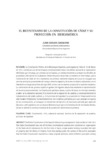Mostrar o rexistro simple do ítem
El bicentenario de la Constitución de Cádiz y su proyección en Iberoamérica
| dc.contributor.author | Cassagne, Juan Carlos | es_ES |
| dc.date.accessioned | 2014-04-30T10:54:16Z | |
| dc.date.available | 2014-04-30T10:54:16Z | |
| dc.date.issued | 2012 | es_ES |
| dc.identifier.citation | Anuario da Facultade de Dereito da Universidade da Coruña, 2012, 16: 335-356. ISSN: 1138-039X | es_ES |
| dc.identifier.issn | 1138-039X | es_ES |
| dc.identifier.uri | http://hdl.handle.net/2183/12057 | |
| dc.description.abstract | [Resumen] La Constitución Política de la Monarquía Española, promulgada en Cádiz el 19 de Marzo de 1812, constituyó uno de los ensayos constitucionales mejor concebidos acerca de la organización del Estado que introdujo, por primera vez en España, un sistema tendiente a proteger los derechos de propiedad y libertad de los ciudadanos. Desde ese punto de partida, se sostiene, en este trabajo, que la Constitución de Cádiz de 1812 representa una síntesis, realmente original, en la que se conjugan una serie de principios provenientes del antiguo derecho español y de la neo-ecolástica salmantina con el liberalismo en boga hacia fines del siglo XVIII, si bien con los matices propios de la tradición hispánica. La culminación de ese proceso implicó el quiebre del régimen absolutista mediante la transformación de las estructuras existentes. La Constitución gaditana reposa, a juicio del autor, en tres ejes centrales, a saber: a) la soberanía nacional; b) la doctrina de la separación de poderes y, consecuentemente la independencia del poder judicial; y, c) el principio de legalidad. Su proyección en Hispanoamérica ha sido notable reflejándose, fundamentalmente, en el sistema judicialista puro que adoptan la mayoría de las constituciones, al consagrar la interdicción del ejercicio de funciones judiciales por parte del Ejecutivo y del Legislativo con un alcance distinto al que rige en la Constitución de los Estados Unidos, donde se admite la constitucionalidad de la jurisdicción administrativa primaria. | es_ES |
| dc.description.abstract | [Abstract] The Politic Constitution of the Spanish Monarchy promulgated in Cadiz on March 19th 1812 (the Cadiz Constitution) was one of the best constitutional systems ever conceived on organization of the State which introduced, for the first time in Spain, a legal system tending to protect the right of property and the liberty of citizens. From this starting point, the author of this article postulates that the Cadiz Constitution represents a really-original synthesis, where different principles coming from the ancient Spanish law and from the later Spanish Scholastics of Salamanca, combine with other liberal conceptions in vogue toward the end of the 18th century, although acknowledging connotations that befit the Spanish tradition. The culmination of said process meant the breakdown of the absolutist regime by means of existent structures transformation. The Cadiz Constitution leaned, according to the author, on three main premises, thus: (a) on national sovereignty, (b) on separation of powers doctrine (consequently, on independence of the judicial branch); and (c) on rule of law. Its projection on Spanish America has been remarkable, and it becomes self evident in the purely-judicialist system of their constitutions, all of which ban the Executive and Legislative branches from exercising judicial functions, differently from the Constitution of the United States of America, where administrative primary jurisdiction is constitutionally allowed. | es_ES |
| dc.language.iso | spa | es_ES |
| dc.publisher | Universidade da Coruña | es_ES |
| dc.subject | Constitución | es_ES |
| dc.subject | 1812 | es_ES |
| dc.subject | Soberanía nacional | es_ES |
| dc.subject | Doctrina de la separación de poderes | es_ES |
| dc.subject | Principio de legalidad | es_ES |
| dc.subject | Constitution | es_ES |
| dc.subject | National sovereignity | es_ES |
| dc.subject | Separation of powers doctrine | es_ES |
| dc.subject | Rule of law | es_ES |
| dc.title | El bicentenario de la Constitución de Cádiz y su proyección en Iberoamérica | es_ES |
| dc.type | info:eu-repo/semantics/article | es_ES |
| dc.rights.access | info:eu-repo/semantics/openAccess | es_ES |






